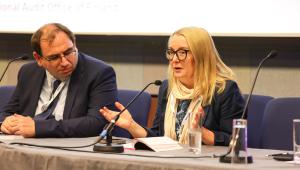Demand on social care will continue to rise and services, particularly non-statutory ones, will continue to be cut, Drew Cullen, CIPFA’s director of public affairs, told the session, which examined the pressures on local government, yesterday evening.
“The funding envelope is not going to get any bigger,” he told the delegates. “In a competitive market not everyone can be a winner”.
Care costs will rise “inexorably”, Cullen said, and reminded the audience that in the last of CIPFA’s annual survey of chief finance officers – released in November last year – that children’s social care was now the biggest concern for upper-tier CFOs. For the previous four years the biggest worry for CFOs had been adult social care.
“Nice-to-have services will be culled,” he said. The many statutory services provided by councils were also at risk of cuts, Cullen warned.
Councils had been going for “low hanging fruit” to keep costs down and reducing spend through outsourcing, such as using shared services, but this had sometimes come at the cost of “service quality”, he pointed out.
Jane Dudman, a Guardian journalist specialising in public service leadership and policy, agreed that “things are about to get worse [for local government]”.
She believed the Budget at the end of this month and Spending Review next year would not provide any great funding boost for local government.
Housing was one of the areas currently putting a great deal of pressure on councils, she told the audience.
The government should recognise the “impact that welfare reform has had on levels of homelessness in this country”, Dudman said.
She also pointed out that right to buy was stripping councils of not just valuable housing stock but losing them millions of pounds every year.
“Councils are not able to provide housing at low cost to people who need it, including key workers,” she said.
Theresa May did not address the issue of right to buy when she recently pledged £2bn for housing associations from 2022 at a National Housing Federation conference recently, she noted.
Sarah Wollaston, chair of the health select committee, focused on the issue of the “huge workforce challenge” in the NHS.
“It’s not just about training the workforce but retaining people,” she told the audience. There was no point in managing to recruit people for them to then “feel so overstretched they leave”, the MP told the session.
She suggested public health money be ring-fenced, which she said would reduce the pressure on the NHS. Otherwise you were “back to plugging trust deficits”, she said. NHS trust deficit increased 10% between the first quarter of last financial year and this, official figures recently revealed.
The MP said services “need to be more joined up”. She also said was “disappointed” the government was claiming there would be a dividend after Brexit that could be ploughed back into public services. She said it was “more likely” we will pay an exit bill that will take money away from public services.
Chancellor Philip Hammond had suggested in his speech to the conference on Monday that the prime minister would secure a deal with the EU that would yield a dividend to be spent on public services. The National Audit Office this April suggested the government’s estimate of £35-39bn EU exit bill was likely to be too low.
Wollaston also suggested there should be a hypothecated health care tax as “people are more willing to pay [extra tax] if they can see where the tax is going”.
Emily Andrews, associate director of the IfG, told the audience that better use of technology could help ease the pressures on local government.
It would not be a “panacea”, she told the audience and did not have to be highly sophisticated – such as ‘FaceTime’ GPs appointments – but just about people using technology more “in their own lives”.
“Our courts still run on paper,” she said. “That makes no sense”.
UK public services are considered to be behind with technology. Bronwen Maddox, director of the IfG, reminded the session: “The NHS is the biggest purchaser of fax machines in the world”.
Health secretary has said investment in technology is one of his priorities and in July pledged £487m for a range of upgrades to systems in the NHS, including replacing doctors’ pagers with a smartphone app.
UPDATE at 2pm on 3/10/18:
Since this story was written Theresa May has announced at the Conservative Party Conference that she plans to end austerity.
The prime minister pledged in Birmingham today: “Debt as a share of the economy will continue to go down, support for public services will go up.”











